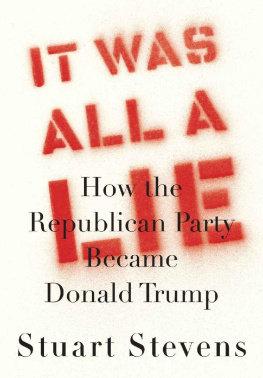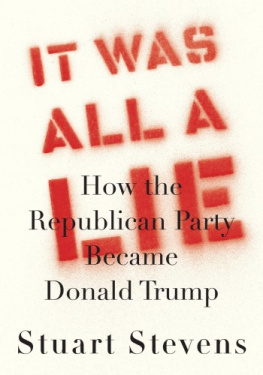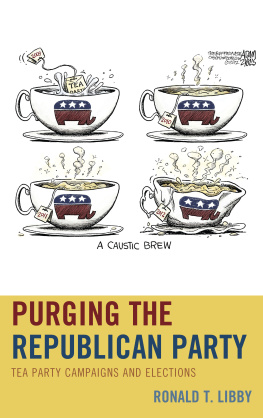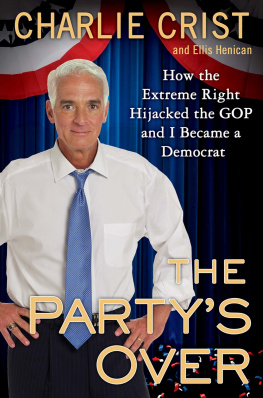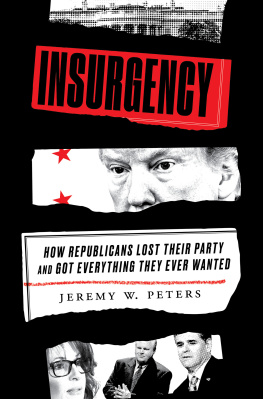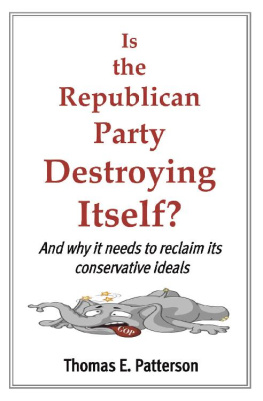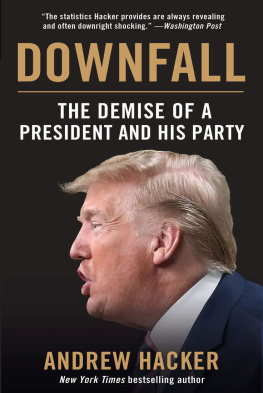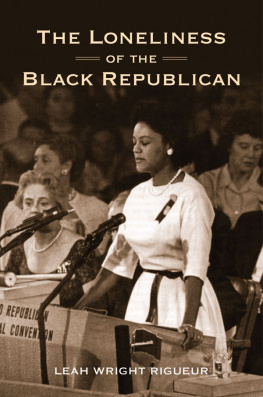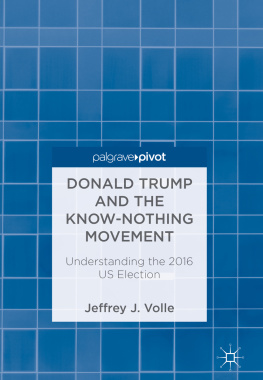Also by Stuart Stevens
The Innocent Have Nothing to Fear: A Novel The Last Season: A Father, a Son, and a Lifetime of College Football The Big Enchilada: Campaign Adventures with the Cockeyed Optimists from Texas Who Won the Biggest Prize in Politics Feeding Frenzy: Across Europe in Search of the Perfect Meal Scorched Earth: A Political Love Story Malaria Dreams: An African Adventure Night Train to Turkistan: Modern Adventures Along Chinas Ancient Silk Road

THIS IS A BORZOI BOOK
PUBLISHED BY ALFRED A. KNOPF
Copyright 2020 by Stuart Stevens
All rights reserved. Published in the United States by Alfred A. Knopf, a division of Penguin Random House LLC, New York, and distributed in Canada by Penguin Random House Canada Limited, Toronto.
www.aaknopf.com
Knopf, Borzoi Books, and the colophon are registered trademarks of Penguin Random House LLC.
Library of Congress Cataloging-in-Publication Data
Names: Stevens, Stuart, author.
Title: It was all a lie : how the Republican Party became Donald Trump / Stuart Stevens.
Description: First edition. | New York : Alfred A. Knopf, 2020. | This is a Borzoi book published by Alfred A. Knopf. | Includes bibliographical references.
Identifiers: LCCN 2019048755 | ISBN 9780525658450 (hardcover) | ISBN 9780525658467 (ebook)
Subjects: LCSH: Trump, Donald, 1946 | Republican Party (U.S. : 1854 )History. | ConservatismUnited StatesHistory. | Political cultureUnited StatesHistory. | United StatesPolitics and government19451989. | United StatesPolitics and government1989 Classification: LCC JK2356 .S746 2020 | DDC 324.2734dc23
LC record available at https://lccn.loc.gov/2019048755
Ebook ISBN9780525658467
Cover art and design by Chip Kidd
ep_prh_5.5.0_c0_r0
To the Deep State patriots who are defending America Sometimes party loyalty asks too much. PRESIDENT JOHN F. KENNEDY CONTENTS PROLOGUE IT WAS ALL A LIE
I have no one to blame but myself. I believed. Thats where it all started to go wrong. I was drawn to a party that espoused a core set of values: character counts, personal responsibility, strong on Russia, the national debt actually mattered, immigration made America great, a big-tent party invited all. Legislation would come and go, compromises would be necessary, but these principles were assumed to be shared and defined what it meant to be a Republican for the last fifty years.
What a fool I was. All of these immutable truths turned out to be mere marketing slogans. None of it meant anything. I was the guy working for Bernie Madoff who actually thought we were really smart and just crushing the market. What I missed was one simple reality: it was all a lie.
I come to this not out of bitterness but out of sadness. Its not that I failed. I was paid to win races for Republicans, and while I didnt win every race, I had the best win-loss record of anyone in my business. So yes, blame me. Blame me when you look around and see a dysfunctional political system and a Republican Party that has gone insane. To be sure, others share blame, but if there is any sane path forward for something resembling a conservative governing philosophy in Americaand Im not sure there isit must start with honesty and accountability. I have this crazy idea that a return to personal responsibility begins with personal responsibility.
It is a strange, melancholy feeling to turn sixty-five and realize that what you have spent a good portion of your life working for and toward was not only meritless but also destructive. Among the many Republicans who find Donald Trump somewhere between distasteful and abhorrent, there are two distinct tendencies. One is to say that Trump isnt a real Republican. The other is to say he is just an unconventional president and focus on his policies.
Both are wrong.
As much as Id love to go to bed at night reassuring myself that Donald Trump was some freak product of the systema black swan, as his ludicrously unqualified son-in-law saysI cant do it. I cant keep lying to myself to ward off the depressing reality that I had been lying to myself for decades. There is nothing strange or unexpected about Donald Trump. He is the logical conclusion of what the Republican Party became over the last fifty or so years, a natural product of the seeds of race, self-deception, and anger that became the essence of the Republican Party. Trump isnt an aberration of the Republican Party; he is the Republican Party in a purified form.
I saw the warning signs but ignored them and chose to believe what I wanted to believe: the party wasnt just a white grievance party; there was still a big tent; the other guys were worse. Mostly, though, I just didnt think about it. I loved to win and I won a lot. I loved the feeling that I had a big lever and could move if not the world, then a big enough hunk of it to make a difference.
Donald Trump didnt hijack the Republican Party and force it to bend to his will, abandoning so many avowed bedrock principles. How do I know this? I was there and, yes, I contributed. This is not an I am better than them plea. Im not. But I was more than just a witness to this. I spent 2016 predicting that Donald Trump would not win because I refused to believe what Donald Trump proved about Republicans, about myself, could be true.
I was wrong.
Hold Donald Trump up to the mirror and that bulging, grotesque orange face is todays Republican Party. Working intensely in politics is joining a tribe, and if you do it for many years, a comfortable familiarity begins to define the experience. Do it professionally at a high level with success, and at a certain point you look around and you know where you belong in that tribe. Every two years you work in governor and Senate races, and every four years you probably end up toward the top of a presidential campaign. Ive worked in five presidential races. Four out of five we won the nomination. Two out of five we won it all.
This is a book I never thought Id write, that I didnt want to write. But its the book I now must write. Its a truth to which I can bear witness. Many will argue that my view of the Republican Party is distorted by my loathing of Trump. The truth is that Trump brought it all into clarity and made the pretending impossible.
A word of caution on what this book is not. Those looking for this to be a detailed indictment of sins and horrors committed by those I worked for and with will be disappointed. I am not writing to settle scores or name names. This is no bill of indictment to prepare for the political war crimes trials of the future. There is a collective blame shared by those of us who have created the modern Republican Party that has so egregiously failed the principles it claimed to represent. My jaccuse is against us all, not a few individuals who were the most egregious.
Yes, it was all a lie. But this is the truth.
RACE, THE ORIGINAL REPUBLICAN SIN You start out in 1954 by saying, Nigger, nigger, nigger. By 1968 you cant say niggerthat hurts you. Backfires. So you say stuff like forced busing, states rights and all that stuff. Lee Atwater, 1981
I played the race card in my very first race.
It was 1978 and my first client was running for Congress in Mississippi. His name was Jon Hinson. He had been chief of staff to a Mississippi congressman named Thad Cochran, who was now running for the Senate. (Actually, back then they called the head staffers administrative assistants, or AAs, but as government became more about positioning for that next job and less about service, that sounded too much like secretaries, so the more elevated chief of staff became common. What lobbying shop wants to pay $500,000 for a former AA?) In high school I had been a page when Hinson ran the congressional office, and Id kept in touch when visiting the office on trips to D.C.
Next page
